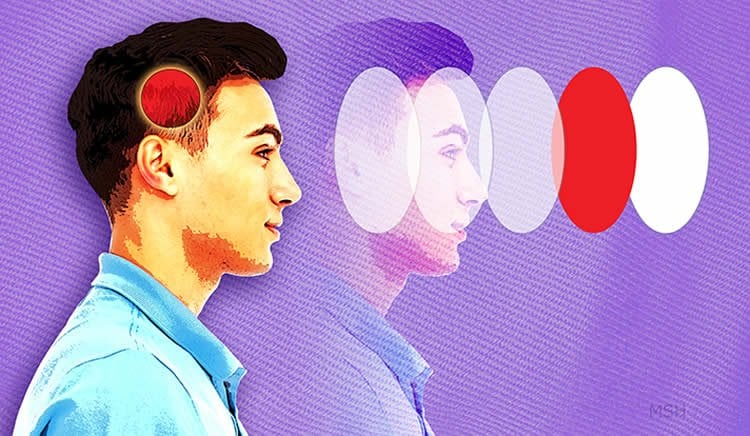Sometimes, decisions we believe we make consciously, such as clicking on a link on a webpage or reaching for a cup of coffee, have already been made — a trick of the mind that may happen more than we think, new research by Yale University psychologists suggest.
“Our minds may be rewriting history,” said Adam Bear, a Ph.D. student in the Department of Psychology and lead author of the paper published April 28 in the journal Psychological Science.
Bear and Paul Bloom performed a couple of simple experiments to test how we experience choices. In one experiment, participants were told that five white circles would appear on the computer screen in front of them and, in rapid-fire sequence, one would turn red. They were asked to predict which one would turn red and mentally note this. After a circle turned red, participants then recorded by keystroke whether they had chosen correctly, had chosen incorrectly, or had not had time to complete their choice.
The circle that turned red was always selected randomly, so probability dictates that participants should predict the correct circle 20% of the time. But when they only had a fraction of a second to make a prediction, these participants were likely to report that they correctly predicted which circle would change color more than 20% of the time. In contrast, when participants had more time to make their guess — approaching a full second — the reported number of accurate predictions dropped back to expected levels of 20% success, suggesting that participants weren’t simply lying about their accuracy to impress the experimenters.

What happened, Bear suggests, is that events were rearranged in subjects’ minds: People subconsciously perceived the color red before they predicted it would appear, but consciously experienced these two things in the opposite order. The conscious experience of choice may be constructed after we act — even when it feels like it is the cause of our behavior, say the researchers.
Bear and Bloom’s research builds on past work suggesting that many decisions seem to be under more conscious control than they actually are. In many cases, consciousness may simply be window dressing, note the researchers.
Bear said it is unknown whether this illusion is caused by a quirk in perceptual processing that can only be reproduced in the lab or whether it might have “far more pervasive effects on our everyday lives and sense of free will.”
Source: Bill Hathaway – Yale
Image Source: The image is credited to Michael S. Helfenbein and is adapted from the Yale press release.
Original Research: Abstract for “A Simple Task Uncovers a Postdictive Illusion of Choice” by Adam Bear and Paul Bloom in Psychological Science. Published online April 28 2016 doi:10.1177/0956797616641943
Abstract
A Simple Task Uncovers a Postdictive Illusion of Choice
Do people know when, or whether, they have made a conscious choice? Here, we explore the possibility that choices can seem to occur before they are actually made. In two studies, participants were asked to quickly choose from a set of options before a randomly selected option was made salient. Even when they believed that they had made their decision prior to this event, participants were significantly more likely than chance to report choosing the salient option when this option was made salient soon after the perceived time of choice. Thus, without participants’ awareness, a seemingly later event influenced choices that were experienced as occurring at an earlier time. These findings suggest that, like certain low-level perceptual experiences, the experience of choice is susceptible to “postdictive” influence and that people may systematically overestimate the role that consciousness plays in their chosen behavior.
“A Simple Task Uncovers a Postdictive Illusion of Choice” by Adam Bear and Paul Bloom in Psychological Science. Published online April 28 2016 doi:10.1177/0956797616641943






